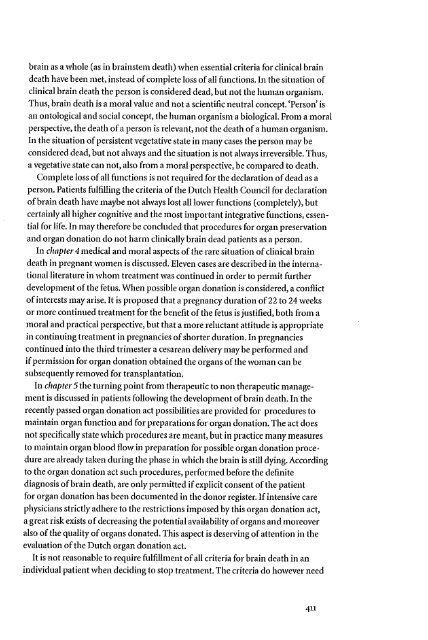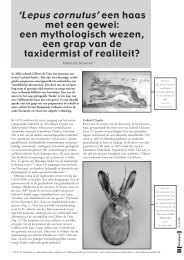Geven en nemen - dr Erwin JO Kompanje
Geven en nemen - dr Erwin JO Kompanje
Geven en nemen - dr Erwin JO Kompanje
Create successful ePaper yourself
Turn your PDF publications into a flip-book with our unique Google optimized e-Paper software.
ain as a whole (as in brainstem death) wh<strong>en</strong> ess<strong>en</strong>tial criteria for clinical brain<br />
death have be<strong>en</strong> met, instead of complete loss of aU fllnctions. In the sitllation of<br />
clinical brain death the person is considered dead, but not the hllman organism.<br />
Thus, brain death is a moral value and not a sci<strong>en</strong>tific neutral concept. (Person' is<br />
an ontological and sodal concept, the human organism a biological. From a moral<br />
perspective, the death of a person is relevant, not the death of a hllman organism.<br />
In the situation of persist<strong>en</strong>t vegetative state in many cases the person may be<br />
considered dead, but not always and the situation is not always irreversible. Thus,<br />
a vegetative state can not, also from a moral perspective, be compared to death.<br />
Complete loss of all functions is not required for the dedaration of dead as a<br />
person. Pati<strong>en</strong>ts fulfilling the criteria of the Dutdl Health Council for dedaration<br />
ofbrain death have maybe not always lost a!llower ftmctions (completely), but<br />
certainlyall higher cognitive and the most important integrative functions, ess<strong>en</strong>tial<br />
for life. In may therefore be conduded that procedures for organ preservation<br />
and organ donation do not harm clinically brain dead pati<strong>en</strong>ts as a person.<br />
In c1/apter 4 medical and moral aspects of the rare sitllation of clinical brain<br />
death in pregnant wom<strong>en</strong> is discussed. Elev<strong>en</strong> cases are described in the internationalHterature<br />
in whom treatm<strong>en</strong>t was continued in order to permit ftuther<br />
developm<strong>en</strong>t of the fetus. Wh<strong>en</strong> possible organ donation is considered, a conflict<br />
of interests may arise. It is proposed that a pregnancy duration of22 to 24 weeks<br />
or more continued treatm<strong>en</strong>t for the b<strong>en</strong>efit of the fetus is justified, bath from a<br />
moral and practical perspective, but that a more relllctant attitude is appropriate<br />
in continuing treatm<strong>en</strong>t in pregnancies of shorter duration. In pregnandes<br />
continued into the third trimester a cesarean delivery may be perfofmed and<br />
if permission for organ donation obtained the organs of the woman can he<br />
subsequ<strong>en</strong>tly removed for transplantation.<br />
In chapter 5 the turnÎ11g point from therapelltic to non therapeutic managem<strong>en</strong>t<br />
is discussed in pati<strong>en</strong>ts fo!lowing the developm<strong>en</strong>t ofbrain death. In the<br />
rec<strong>en</strong>tly passed organ donation act possibilities are provided for procedures to<br />
maÎ11tain organ function and for preparations for organ donation. The act does<br />
not specifically state whieh procedures are meant, but in practiee many measures<br />
to maintain organ blood flow in preparation for possible organ donation procedure<br />
are already tak<strong>en</strong> duriIlg the phase in whieh the brain is still dying. According<br />
to the organ donation act such procedures, perfonned before the definite<br />
diagnosis ofbrain death, are only permitted if explicit cons<strong>en</strong>t of the pati<strong>en</strong>t<br />
for organ donation has be<strong>en</strong> dOCllm<strong>en</strong>ted in the donor register. IE int<strong>en</strong>sive care<br />
physicians strictly adhere to the restrictions imposed by this organ donation act,<br />
a great risk exists of decreasing the pot<strong>en</strong>tialavailability oforgans and moreover<br />
also of the quality of organs donated. This aspect is deserving of att<strong>en</strong>tion in the<br />
evaluation of the Dutch organ donation act.<br />
It is not reasonabIe to require ftllfilhn<strong>en</strong>t of all criteria for brain death in an<br />
individual pati<strong>en</strong>t wh<strong>en</strong> dedding to stop treatm<strong>en</strong>t. The criteria do however need<br />
4 11








